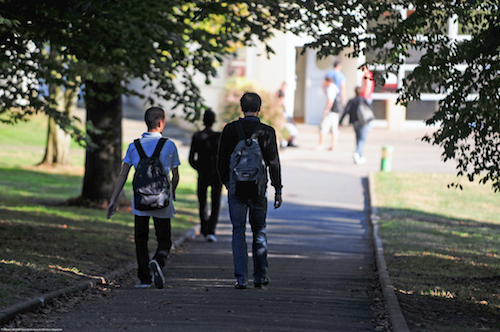Best practice on secularism in higher education and research
- Are teachers free to express their religious beliefs?
-
No, teachers, as civil servants, may not wear clothing that would be tantamount to proselytism or the conspicuous manifestation of a religious affiliation, nor may they make remarks that constitute proselytism.
This principle applies to all public employees working in higher education institutions, whether or not they are in contact with users. - Can teachers wear distinctive religious symbols?
-
Generally speaking, the principle of secularism prohibits not only teachers, but also all public education employees, from manifesting their religious beliefs (Conseil d'Etat, 3 May 2000, Mlle Marteaux, Rec - p. 169). The wearing of a sign indicating membership of a religion is therefore a breach of the obligations of public service law.
- Are students free to display their religious belief?
-
Yes, however this right is not unconditional, it is limited:
- on the one hand, by the ban on committing acts of proselytism (incitement to wear signs of religious affiliation, disruption of teaching, provocation, propaganda, use of religious books or a prayer mat during an examination, etc.),
- on the other hand, by hygiene and safety constraints.
- Can teachers refuse to teach students because of their religion?
-
No. Refusing to teach a student because of religious symbols is discriminatory.
This principle is not absolute: refusal to teach may be justified in certain courses involving particular health and safety constraints. - Can students refuse teachers or supervisors on the grounds of their gender/religion?
-
No; a student cannot challenge the gender mix of teaching or supervision. Nor can they refuse to take part in practical exercises that are part of the course on the grounds that these would be contrary to their beliefs.
Similarly, a student may not refuse to take part in an examination on the grounds of the separation of the sexes allegedly advocated by his or her religion; this situation is likely to lead to disciplinary action by the Academic Council, and before the ordinary civil and criminal courts. - Can students request changes to exam dates or courses on religious grounds?
-
No. Institutions try, as far as possible, to take into account the dates of the main religious holidays for the organisation of examinations, but are in no way required to respond to the demands of religious groups in this respect.
Oral examinations, which are held over several days, may be subject to greater flexibility, but this decision is left to the discretion of the teacher responsible for the examination. - Does the school director have the power to prohibit groups that claim to be supported by certain religious movements from presenting candidates for the elections of student representatives in university elections?
-
No, as long as these groups have not been banned or dissolved for infringing the law.
- How do you determine the conditions for the allocation of premises to student associations?
-
Associations with elected members on central bodies should be treated in the same way. Furthermore, the criteria for allocating premises to associations should be clearly defined; in particular, an agreement will clearly prohibit the use of premises for religious proselytism.
- What about religious references in a student thesis or report?
-
No, no religious references in the body of the text.
Yes, the student is free to include religious references on an "acknowledgements" page.
CPU mars 2015, CPU 2004 et CPU septembre 2015
Sustainable Development & CSR
- GOVERNANCE AND STRATEGY
- ENVIRONMENTAL MANAGEMENT
- TEACHING AND TRAINING
- RESEARCH
- SOCIAL IMPACT AND LOCAL COMMUNITIES
- CONTRIBUTION TO SUSTAINABLE DEVELOPMENT GOALS
- EQUALITY AND DIVERSITY







